 Sign in
Sign in
Education
Business
Palmer Media
At the intersection of learning, media, and the future of work, join us each week as we sense and discover where the future of education is heading. Join host Mike Palmer, the Founder of Palmer Media, as he engages with thought leaders, pioneers, and entrepreneurs exploring the cutting edge of learning in these tumultuous times.

Transforming Professional Learning for Educators with Matthew Kennard
In this episode of Trending in Education, Mike Palmer speaks with Matthew Kennard, CEO of BetterLesson, about the complexities and importance of professional development for teachers. With a career transition from investment banking to edtech, Kennard shares his insights on the evolving landscape of K-12 education. They discuss the traditional and future models of professional learning, emphasizing job-embedded support, continuous improvement, and career pathways for educators. Kennard underscores the crucial role of effective professional development in achieving optimal student outcomes, teacher retention, and overall systemic improvement in education.
Subscribe wherever you get your podcasts. Visit us at TrendinginEd.com for more.
TIMESTAMPS
00:00 Introduction and Guest Welcome
00:39 Matt Kennard's Professional Journey
02:53 Challenges in K-12 Professional Learning
06:15 The Importance of Continuous Improvement
10:00 Rethinking Professional Development
17:44 The Role of Technology in Education
28:20 Final Thoughts and Call to Action
35:2525/11/2024

The New College President with Authors Dr. Eileen Wilson-Oyelaran and Dr. Terrence MacTaggart
In this episode of Trending in Education, we talk with Dr. Eileen Wilson-Oyelaran and Dr. Terrence J. MacTaggart, co-authors of 'The New College President: How a Generation of Diverse Leaders is Changing Higher Education.' We delve into their respective backgrounds, the challenges faced by college presidents today, and the importance of diversity and resilience in leadership. Eileen and Terry share insights from their extensive research, including seven compelling case studies of university leaders who have thrived amidst adversity. We also discuss the future of higher education, the importance of mission-driven leadership, and how to identify and support potential candidates from diverse backgrounds.
Don't miss this surprising deep-dive into what it takes to thrive in higher ed leadership in challenging times.
Subscribe to Trending in Ed wherever you get your podcasts. Visit us at TrendinginEd.com for more.
41:1121/11/2024

Howard Gardner On Education and On Mind
Dr. Howard Gardner is one of the leading minds in education and psychology in the last century. In this special episode of Trending in Ed, he joins host Mike Palmer in a wide-ranging conversation about his life's work that is coinciding with the release of two volumes of his collected writings: The Essential Howard Gardner On Mind and The Essential Howard Gardner On Education.
Gardner is a luminary in psychology and a professor at Harvard Graduate School of Education. He shares his journey, including his developmental psychology training and influential mentors like Jean Piaget and Eric Erikson. We discuss his notable contributions, such as the theory of multiple intelligences and his recent work on ethics and AI. Howard highlights key educational themes through examples like The Good Project and emphasizes the importance of understanding ethics in professional roles. We also touch on societal challenges, including the mental health crisis and the role of influencers. Gardner shares his thoughts from his latest compilations and blogs, and reflects on the importance of mentorship and humanism in today's world. Don't miss this chance to go deep with one of the great minds in education.
Subscribe to Trending in Education wherever you get your podcasts. Visit us at TrendinginEd.com for more.
49:5514/11/2024

Educating Families Who Slow Travel the World with Rekha Magon
Mike Palmer speaks with Rekha Magon, co-founder and head of education at Boundless Life, who joins from Bali to discuss her innovative approach to global education. We explore how Rekha's background in mindfulness and her experience homeschooling her children led her to create a network of micro-schools across beautiful locations including Portugal, Greece, Italy, Montenegro, and Spain.
Rekha shares how Boundless Life provides a turnkey solution for families wanting to slow travel the world, combining furnished apartments, co-working spaces, and Montessori-inspired education with Finnish pedagogical methods. We discuss how the pandemic created the perfect conditions for reimagining education, leading many families to seek alternatives that blend travel, community, and experiential learning.
The conversation delves into how Boundless Life's educational model emphasizes real-world problem-solving, cultural immersion, and mixed-age learning environments. Rekha explains how these experiences help develop crucial soft skills like adaptability and communication that will serve children well in an uncertain future.
Key takeaways:
Mixed-age classrooms foster natural leadership and collaboration while reducing unhealthy competition among peers
Slow travel and cultural immersion help children develop essential soft skills like adaptability and communication that AI cannot replicate
Parents can nurture their children's natural love of learning by thinking outside traditional educational models, whether traveling or staying local
We conclude with advice for parents and educators about nurturing children's natural love of learning, whether through travel or finding creative alternatives closer to home.
Subscribe wherever you get your podcasts. Visit us at TrendinginEd.com for more.
29:2525/10/2024

Building a Future Ready Workforce with Joshua Wright
In this episode of Trending in Education, Mike Palmer sits down with Josh Wright, Executive Vice President of Growth, Education and Government for Lightcast, to discuss the future of work and workforce demographic shifts. We dive deep into Lightcast's report "The Rising Storm: Building a Future Ready Workforce to Withstand the Looming Labor Shortage." Josh shares insights on the demographic drought facing the workforce, including accelerated baby boomer retirements, declining birth rates, and decreasing labor force participation.
We explore the potential impacts of these trends on various industries and regions, as well as possible solutions such as automation, immigration, and improved career navigation. The conversation highlights the crucial role of community colleges and local workforce development initiatives in addressing these challenges.
Key takeaways:
The US is facing a significant workforce shortage due to demographic shifts, with impacts varying by industry and region.
Local, data-driven approaches to workforce development and education are essential for addressing these challenges.
There's a growing need for skills-based hiring and more agile, adaptable training programs to prepare workers for the changing job market.
Don't miss out on more insightful conversations like this one – Subscribe to Trending in Ed wherever you get your podcasts.
34:4915/10/2024

Bridging the Skills Gap with Sara Leoni
In this special bonus episode recorded at the HolonIQ Back to School Summit in New York City, we catch up with Sara Leoni, CEO & Founder of Ziplines Education, for a candid hallway conversation. Sara shares her journey from Division I softball player to EdTech entrepreneur, discussing how her athletic background shaped her leadership style and business acumen.
We dive into Ziplines Education's mission to accelerate careers by partnering with higher education institutions to deliver industry-focused certificates. Sara explains how they're addressing the skills gap for adult learners, particularly in Middle America, by offering programs in digital marketing, business analytics, project management, and more.
The conversation touches on the rapidly evolving landscape of tech-enabled careers and the increasing importance of continuous learning. We explore how Ziplines is integrating generative AI into their curriculum and why they've launched a course on AI prompting.
Key takeaways:
Ziplines Education focuses on partnering with public institutions to serve the underrepresented middle-American market.
The half-life of skills is shortening, necessitating ongoing education and upskilling.
Understanding the unique needs of the education market is crucial for EdTech entrepreneurs.
Join us for this insightful discussion on the future of work, the importance of industry-recognized credentials, and how Ziplines Education is helping adult learners navigate the rapidly changing job market.
Subscribe where you pod. Spread the word.
16:5911/10/2024

Breaking Barriers to Workforce Participation with Jane Oates
In this episode of Trending in Education, host Mike Palmer welcomes back Jane Oates, senior policy advisor at Working Nation, for her third (fridge-magnet-earning) appearance on the show. Jane and Mike dive deep into workforce development, education, and the role of technology in shaping the future of work. We discuss Working Nation's "Breaking Barriers" series, the challenges of implementing new technologies in education and workforce development, and strategies for encouraging employee upskilling and AI literacy.
Key takeaways:
Employers should provide time and opportunities for employees to explore and learn new technologies, including AI, in the workplace.
Diversity in all forms, including diversity of thought and experience, is crucial for innovation and problem-solving in the workforce.
Short-term credentials and stackable certificates can provide accessible pathways for career advancement, especially for those who may not pursue traditional college degrees.
Don't forget to subscribe to Trending in Education to ensure you don't miss out on more insightful conversations like this one with Jane Oates and other leaders in the education and workforce development space.
27:4208/10/2024

Using Kits to Teach Structural Engineering with Marcio Sequeira
Mike Palmer welcomes Marcio Sequeira, founder and CEO of MOLA, to discuss structural engineering education and the future of architecture.
Marcio shares his background and how his interest in architecture and structures was influenced by his parents' careers in steel construction and physics. He explains how he developed MOLA, a physical model kit that uses springs and magnets to teach structural concepts, out of frustration with abstract structural engineering classes in university.
We explore the importance of hands-on, visual learning in architectural education and how MOLA helps students develop intuition about building behavior. Marcio discusses MOLA's use in university settings, including at MIT for teaching structural dynamics.
The conversation touches on the balance between artistic vision and functionality in architecture, using examples like Gaudi's work in Barcelona. We discuss the challenges of teaching architectural concepts earlier in K-12 education and the potential for tools like MOLA to spark interest in the field.
Marcio shares insights on emerging trends in architecture, including the increasing use of BIM (Building Information Modeling) in Brazil. We also explore the impact of climate change and environmental concerns on architectural design.
The episode concludes with Marcio's advice for aspiring architects and educators, emphasizing the value of persistence and long-term vision. He shares that MOLA took 20 years from concept to a successful company, highlighting the importance of dedication in pursuing one's goals.
Key takeaways:
Hands-on, visual learning tools like MOLA can significantly enhance structural engineering education.
Integrating architectural concepts earlier in K-12 education could help spark interest in the field.
Persistence and long-term vision are crucial for success in both education and entrepreneurship.
Subscribe to Trending in Education to make sure you never miss a great conversation like this one! Visit us at TrendinginEd.com for more.
40:5701/10/2024

Instructure CEO Steve Daly on Canvas LMS and the Future of EdTech
In this episode of Trending in Education, Mike Palmer sits down with Steve Daly, CEO of Instructure, at the HolonIQ Back to School Summit in New York. Steve shares his journey from mechanical engineering to leading the company behind Canvas, the leading learning management system (LMS). We explore the changing landscape of education, the role of technology in learning, and the potential impact of AI on the future of edtech.
Key takeaways:
The educational journey is becoming more flexible, with a growing need for diverse pathways and recognition of skills beyond traditional degrees.
AI in education shows promise, but its immediate impact may be more focused on simplifying administrative tasks for teachers rather than replacing human interaction.
Career success often comes from pursuing opportunities that bring energy and passion, rather than following a predetermined path.
Steve describes Instructure's approach to integrating AI securely, the importance of personalization in learning, and the role the company's strategic partnerships play in its strategic development. Steve also offers valuable career advice based on his extensive experience in the tech industry.
Subscribe to Trending in Ed wherever you get your podcasts. Visit us at TrendinginEd.com for more.
22:5924/09/2024

Leading in K12 EdTech with James Rhyu
Kicking off our 9th Season of Trending in Education, we're joined by James Rhyu, CEO of Stride, Inc., formerly known as K12. With 25 years experience in the education technology space, Stride offers unique perspectives on the evolving landscape of K-12 education.
Rhyu, who started his career in accounting and finance, found his way to education through a personal situation and a fortuitous job offer. Now in his 13th year with the company, he's developed a deep appreciation for the needs of families in education. We discuss how the pandemic has changed perceptions of online learning. While many families struggled during this time, it also opened eyes to new possibilities in education. Rhyu emphasizes the importance of recognizing teachers' efforts during this challenging period.
The conversation turns to personalized learning and the role of AI in education. James cautions against rushing to implement AI without careful consideration, especially in K-12 education where error rates could have significant impacts on children's learning.
We explore Stride's approach to personalized learning, which includes not just academic content but also addressing students' emotional and physical needs. Rhyu envisions a future where AI can help create individualized learning plans and assist teachers with administrative tasks like lesson planning.
The discussion broadens to the concept of treating families as customers in education. James argues for giving families more choices and respecting their understanding of what's best for their children. He draws parallels to other industries that have evolved to be more customer-focused over the past 25 years.
Looking ahead, Rhyu sees innovation as key to improving the educational experience. This could involve offering more flexibility in learning formats, integrating technology effectively, and adapting to how students consume information through short-form videos and gaming.
We wrap up with Rhyu's advice for listeners, emphasizing the importance of thoughtful planning in addition to pursuing passion and taking risks. He also calls for depoliticizing education and focusing on what's best for children and families.
As we conclude, James reminds us that K-12 education is about the future of our country and our children. He urges us to put aside political differences and concentrate on what truly matters - the kids.
Subscribe to Trending in Ed wherever you get your podcasts. Visit us at TrendinginEd.com for more sharp perspectives on what's new and emergent in the world of learning.
42:1417/09/2024

Talkin' About AI in Praxis?!?! with Mike Yates
In this episode of Trending in Education, we sit down with Mike Yates, a senior designer at Teach for America's Reinvention Lab. Mike shares his journey from a student who hated school to becoming an innovative educator and AI enthusiast. We explore his experiences in various educational settings, including juvenile detention centers and experimental schools, and how these shaped his approach to teaching and learning.
Mike discusses his current work at Teach for America's Reinvention Lab, where he focuses on leveraging AI and other emerging technologies to improve educational outcomes. We delve into the potential of generative AI in education and the importance of making these tools accessible to students and educators alike. Mike references the work of Ruha Benjamin as an influence in his understanding of the promise and perils of technology.
Throughout the conversation, Yates emphasizes the need for educators to stay connected with youth culture, using platforms like TikTok to understand and engage with students more effectively. We also touch on the risks and opportunities presented by AI in education, including issues of bias and equity.
Key takeaways from the episode include:
The importance of putting AI tools in the hands of young people to foster creativity and future employability.
The need for educators to become media literate and engage with platforms like TikTok to stay relevant to their students.
The crucial role of human interaction in education, even as we integrate more AI technology.
We conclude with Mike's insightful reminder that the most effective use of AI in education should create more room for meaningful human moments.
Subscribe to Trending in Education wherever you get your podcasts. Check out video versions of the podcast on Youtube and Spotify.
36:4110/09/2024

Are Grades Failing Our Future? with Dr. Joshua R. Eyler
In this episode of Trending in Education, host Mike Palmer sits down with Dr. Joshua R. Eyler, author of Failing Our Future: How Grades Harm Students and What We Can Do About It. We dive deep into the complex world of grading systems and their impact on students' learning and well-being.
Dr. Eyler, who directs the Center for Teaching and Learning at the University of Mississippi, shares his journey from English professor to educational researcher. We explore the historical context of grading, its unintended consequences, and the growing movement for grading reform.
Our conversation covers a wide range of topics, including:
The psychological impact of grades on students' motivation and mental health
How traditional grading systems can reinforce societal inequities
Alternative assessment methods, such as standards-based grading and portfolio assessments
The challenges of institutional change in education
The role of grades in the evolving landscape of work and artificial intelligence
Key takeaways:
Grades often hinder the natural learning process and can contribute to mental health issues among students.
There's a growing movement towards alternative grading systems that prioritize learning over evaluation.
Rethinking grading practices could better prepare students for the future of work, which demands creativity and risk-taking.
Whether you're an educator, parent, or simply interested in the future of education, this episode offers valuable insights into how we might reimagine assessment to better serve learners and society. Subscribe where you get your pods. Video versions now live on Youtube and Spotify.
32:4803/09/2024

Reimagining Education Experiences with VR with Josh Reibel
In this episode of Trending in Education, we dive into the exciting world of immersive learning with Josh Reibel, CEO of Dreamscape Learn. We explore how virtual reality and cinematic storytelling are revolutionizing education, particularly in STEM fields. Josh shares insights on Dreamscape Learn's innovative approach, which combines Hollywood-style narratives with rigorous academic content to create engaging, interactive learning experiences.
We discuss the company's origins, its collaboration with Arizona State University, and the impressive results they've seen in student engagement and performance. Josh explains how their VR experiences work, from asynchronous biology labs to synchronous classroom sessions, and how they're addressing scalability challenges.
Throughout the conversation, we touch on various topics including:
The process of creating immersive learning content
The impact of avatar-based interactions on student participation
The potential applications of generative AI in their platform
The importance of maintaining academic rigor while leveraging entertainment techniques
Key takeaways from the episode include:
Immersive learning experiences can significantly increase student engagement and success rates, particularly in challenging STEM courses.
The combination of Hollywood storytelling techniques and academic content creates a powerful tool for capturing and maintaining student attention.
While creating high-quality immersive content is complex, there's growing potential for educators to develop their own experiences using accessible tools.
We conclude with Josh's insights on innovation in education technology and his vision for the future of learning spaces as "departure hubs" rather than isolated classrooms.
Subscribe wherever you get your podcasts. Visit us at TrendinginEd.com for more sharp takes on the future of learning.
48:1527/08/2024

Transforming K12 Education with Teletherapy with Kate Eberle Walker
In this episode of Trending in Education, host Mike Palmer welcomes back Kate Eberle Walker, CEO of Presence, to discuss the evolving landscape of special education and teletherapy in schools. Kate shares insights on how Presence is leveraging technology to address the growing demand for special education services amidst staffing shortages.
Kate explores the impact of the pandemic on teletherapy adoption and the subsequent shifts in perception. She discusses Presence's innovative approach to connecting remote therapists with schools, highlighting the benefits of their teletherapy platform for both clinicians and students. The conversation delves into the potential of AI to streamline administrative tasks, allowing therapists to focus more on student engagement.
The discussion also touches on broader trends in special education, including the increasing need for mental health support and the importance of early identification. Kate shares her vision for the future of the field, emphasizing the need for more accessible education pathways to grow the workforce.
Three key takeaways:
Teletherapy and technology are playing a crucial role in addressing the shortage of special education professionals.
AI has the potential to significantly reduce administrative burdens on therapists, allowing them to serve more students effectively.
There's a growing need for mental health support in schools, with a focus on proactive identification and universal access.
Don't miss this insightful conversation on the intersection of technology and special education. Subscribe to Trending in Education for more discussions on the future of learning and educational innovation.
30:3720/08/2024

Building a Platform for Custom Chatbots with Alden Do Rosario and Dr. Phil Hendrix
In this episode of Trending in Education, host Mike Palmer welcomes Alden Do Rosario, founder of Custom GPT AI, and Dr. Phil Hendrix to discuss the emerging landscape of custom chatbots and AI in higher education. We explore the origins of Custom GPT AI and delve into a white paper co-authored by Dr. Hendrix on the adoption of AI in universities.
The conversation covers various aspects of AI implementation in educational settings, from individual faculty use to university-wide applications. We discuss the importance of responsible AI, addressing concerns about hallucinations and misinformation. The guests share insights on how custom GPTs can enhance learning experiences, improve student services, and provide valuable data for educators.
Key takeaways from the episode include:
The importance of curated, trusted data in building custom AI solutions for educational institutions.
The potential of AI to personalize learning experiences and adapt to individual student needs.
The need for universities to embrace AI technologies to prepare students for an AI-integrated workplace.
Alden concludes by emphasizing the importance of a "crawl, walk, run, fly" approach to AI adoption in higher education, encouraging institutions to start small and scale up as they gain experience and confidence in using these transformative technologies. Subscribe wherever you get your podcasts.
37:0906/08/2024

The Future of Learning, Workforce, and Infrastructure with Katy Knight
In this episode of Trending in Education, Mike Palmer welcomes Katy Knight, President and Executive Director of the Siegel Family Endowment. We dive into the intersection of technology, society, and education, exploring how these elements shape our future. Mike references Katy's recent appearance on The Cusp with Paul Fain in the open.
Katy shares her journey from Google to philanthropy, discussing the Siegel Family Endowment's focus on learning, workforce, and infrastructure. We explore the current state of AI in education, debating its potential and limitations. Katy emphasizes the importance of addressing fundamental issues in education before fully embracing AI solutions.
We also delve into the changing landscape of work and how technology is reshaping career paths. Katy highlights the need for better data interoperability in education systems and the importance of digital literacy in our tech-driven world.
Key takeaways from this episode:
AI in education should be approached cautiously, focusing on solving real problems rather than being a cure-all solution.
The integration of physical and digital worlds through technologies like augmented reality could rebalance our relationship with technology.
We should strive to be in charge of technology, not let it control us, by becoming informed consumers and diligent creators.
Subscribe to Trending in Education to ensure you don't miss out on these insightful conversations about the future of learning and technology.
32:2030/07/2024

Gen AI Enters the Peak of Inflated Expectations, The Uncanny Valley and More
In this episode of Trending in Education, Mike Palmer and his AI co-host Nancy explore whether generative AI in education has entered the peak of inflated expectations or even the trough of disillusionment on the Gartner Hype Cycle. We discuss the origins of the Hype Cycle and its relevance to current AI trends.
Then we dive into recent developments, including the LAUSD's experience with an AI chatbot and Scarlett Johansson's battle with OpenAI over the rights to her voice. These events highlight growing concerns about data privacy, cybersecurity, and intellectual property in the AI space.
We also examine the concept of the Uncanny Valley and its impact on AI adoption, emphasizing the need for human involvement to smooth over AI's shortcomings. The discussion touches on the challenges of data interoperability in education and the importance of solving real problems with seamless, user-friendly solutions.
Key takeaways:
Generative AI may be entering the trough of disillusionment, with increasing focus on negative stories and backlash.
Data privacy, cybersecurity, and intellectual property concerns are becoming more prominent in AI implementation.
Human involvement remains crucial in AI integration, particularly in addressing the Uncanny Valley effect and ensuring effective emotional design.
Join us for this insightful exploration of AI's current state in education. Don't forget to subscribe to Trending in Education for more thought-provoking discussions on the future of learning and technology!
16:1322/07/2024

Breaking Down Mary Meeker's AI & Higher Education Report
In this episode of Trending in Education, Mike Palmer delves into Mary Meeker's latest report from Bond Capital, "AI and Universities: Will Masters of Learning Master New Learnings?" Palmer examines Meeker's insights on global market capitalization leaders, the accelerating adoption of digital platforms, and the U.S.'s dominance in machine learning models and AI investment in industry. He explores trends in education technology, student debt, and international academic performance rankings.
Mike also discusses three emerging trends discovered in parallel with Meeker's latest report: the Gen AI hype cycle reaching its peak, post-secondary disruption, and the importance of durable skills to battle AI fatigue and Clippy's Revenge.
Key takeaways:
U.S. technology companies lead in global market capitalization.
AI adoption is accelerating rapidly, with ChatGPT reaching 100 million users in record time.
Higher education faces challenges in keeping pace with industry innovation in AI.
Palmer concludes by inviting listeners to share their thoughts on future topics and encourages engagement with the show. Subscribe wherever you get your podcasts. Visit us at TrendinginEd.com for more.
Also, check out our Youtube Playlist of conversations on Higher Ed Disruption.
16:5516/07/2024

Crossing the Post-Secondary Canyon with Coleen Keating-Crawford and Elizabeth Booze from Teach for America
Mike Palmer speaks with Colleen Keating-Crawford and Elisabeth Booze from Teach for America's Reinvention Lab about their study, "Crossing the Canyon: Ethnographic Findings About Life After High School."
We explore youth perceptions of life after high school, discussing the pressure to attend four-year colleges and the growing skepticism about higher education. The conversation introduces a framework for understanding different types of support organizations can provide to youth, categorized as trail guides, transport helicopters, bridge builders, and mapmakers.
Key takeaways:
Youth are critically examining institutions and seeking authenticity in their post-high school journeys.
There's a need for a more cohesive ecosystem of support for young people transitioning to adulthood.
Organizations can use the presented framework to assess and improve their support for youth in local contexts.
We encourage listeners to check out the full "Crossing the Canyon" report and subscribe to Trending in Education wherever you get your podcasts. Visit us at TrendinginEd.com for more.
45:0001/07/2024

Why Mindset Matters and How Higher Ed Helps Develop it with Dan Porterfield
Mike Palmer welcomes Dan Porterfield, President and CEO of the Aspen Institute and author of Mindset Matters: The Power of College to Activate Lifelong Learning, to discuss the value of higher education in fostering growth mindsets. Dan shares his background and explains why he wrote the book, emphasizing the importance of appreciating what college offers to young adults during a formative time in their lives. We explore the five growth mindsets Dan identifies: discovery, creation, collaboration, mentorship, and striving. The conversation touches on how these mindsets prepare students for a rapidly changing world and work life.
We delve into the role of productive struggle, resilience, and overcoming imposter syndrome in college experiences, especially for first-generation students. Dan provides examples of students he mentored while President of Franklin and Marshall University who successfully navigated these challenges. The discussion also covers the importance of faculty mentorship and creating a supportive culture on campus.
Key takeaways:
Growth mindsets developed in college are valuable assets in today's fast-changing economy.
Faculty play a crucial role in helping students develop confidence and overcome challenges.
Investing in education at all levels is vital for national competitiveness and democracy.
Dan concludes with an inspiring message about the power each individual has to create their own education and growth opportunities.
Subscribe to Trending in Ed wherever you get your podcasts. Visit us at TrendinginEd.com for more sharp takes on what's emerging in the world of education.
37:0424/06/2024

Stepping Up Summer 2024
We kick off this special "Stepping Up" edition by welcoming back our virtual co-host Nancy to discuss the AI revolution happening in 2024. The episode explores what "stepping up" means in this new era of agentic intelligence and transformative learning technologies.
Host Mike Palmer reflects on recent conversations with guests like Brian Rosenberg, Dwayne Matthews, and students from the Marcy Lab School - all highlighting the importance of doing hard things, embracing cognitive surplus, and developing durable "brain-to-brain" skills. We also bring in conversations with Bror Saxberg and Charles Fadel to really round out the perspectives.
Nancy emphasizes that while AI tools are rapidly advancing, humans must step up by designing compelling experiences that leverage these technologies to drive motivation, vision and human will. We examine the transition of AI from a scientific phase to an engineering one, where the promise of personalization at scale is an emerging challenge.
Mike concludes with a highlight from the Palm Court Podcast featuring Dr. Jonathan White about getting comfortable with the messiness of working on real problems.
Three key takeaways:
Stepping up means identifying the winners and transformative use cases as agentic AI steps up (or falls short).
Developing "brain-to-brain" skills like empathy, collaboration and perspective-taking will be crucial for humans to thrive alongside AI.
We must get better at discerning problems and mapping the right AI/human tools to solve the messy, complex challenges ahead.
Subscribe to Trending in Ed wherever you get your podcasts to join us in stepping up to this new AI-enabled future of learning.
24:0919/06/2024

Teaching Writing in the Age of AI with Dr. Jennifer Wells
Dr. Jennifer Wells, the Director of Writing at New College of Florida, joins Mike Palmer to delve into the significance of writing skills in higher education and beyond. Jennifer shares her professional journey, highlighting the importance of fostering a culture of writing excellence and providing students with the necessary supports they need to learn and to put in meaningful effort into the writing process. You can learn more about Jennifer's writing school and the workshops she offers here.
We explore the challenges faced by students transitioning from high school to college, emphasizing the need for a shift in mindset towards writing as a process of thinking and refining ideas rather than having to be perfect right away. Jennifer underscores the value of embracing revisions, project management, and time management skills like Pomodoro, which are transferable to various professional contexts.
As AI writing tools continue to evolve, Jennifer provides insights into their potential impact on college admissions essays and academic writing. We discuss the importance of cultivating a human connection through writing and the role of educators in guiding students to develop their unique voices and perspectives.
Key Takeaways:
Writing is a fundamental skill that transcends academic boundaries, fostering critical thinking, resilience, and effective communication in both professional and personal spheres.
Educators should prioritize teaching writing as a process, encompassing revision, project management, and time management, to equip students with transferable skills for lifelong learning and success.
While AI writing tools can be useful in certain contexts, such as brainstorming and drafting, they cannot replace the human element of writing, which involves personal expression, nuanced thought processes, and the ability to connect with readers.
Concluding the episode, we emphasize the need for ongoing collaboration between secondary and post-secondary educators, as well as employers, to bridge gaps and align curriculum with the skills and dispositions necessary for students to thrive in an ever-evolving world.
Subscribe wherever you get your pods. Visit us at TrendinginEd.com for more.
34:1313/06/2024

Bror Saxberg | Learner-Centered AI and the Redefinition of Human Skills
Bror Saxberg, the Founder of LearningForge, rejoins Mike Palmer for the thrilling conclusion of our learning science trifecta of episodes! In this mind-bending discussion, Bror dives deep into the transformative potential of AI in education and redefining human skills. He draws insightful parallels to fields like medicine, highlighting how a deeper understanding of "biology" can fuel innovation - in this case, uncovering how humans truly learn and stay motivated.
Bror envisions AI as the pen(cil) for drafting richer, more personalized learning experiences, from content production to adaptive tutoring. But he doesn't stop there, challenging conventional career trajectories. What if the path to becoming an expert editor or investment banker looked completely different in an AI-powered world?
Brace yourself as Bror expounds on the "badly designed" human brain and the urgency of prioritizing lifelong, transferable skills. Get ready to rethink everything from preschool curricula to that obsession with worksheets!
🧠 Key Takeaway: Don't spray tech on learning problems; understand the human learning "biology" first.
✏️ Key Takeaway: AI can revolutionize content creation and tutoring by personalizing to learners' contexts and motivations.
⚡ Key Takeaway: Prioritize building durable "brain-to-brain" skills like empathy, perspective-taking, and collaboration from an early age.
Bror leaves us inspired by AI's promise for more optimized, human-centered learning - if we have the foresight to plan accordingly. Get ready to redefine your own skills for the AI era!
Subscribe to Trending in Ed wherever you get your podcasts. Visit us at TrendinginEd.com for more sharp takes on the future of education.
48:2210/06/2024

AI Architects and the Future of Learning Content with Eric Stano
Mike Palmer welcomes Eric Stano, Vice President of Consulting, Curriculum, and Product Strategy at Magic EdTech. We delve into Eric's fascinating journey in the world of educational publishing and content development, spanning over 30 years. You can check out Magic EdTech's blogs here.
Eric shares insights into his role at Magic EdTech, a digital services provider that partners with educational publishers and edtech companies. He explains how the advent of generative AI has disrupted and accelerated the content creation process, leading to the integration of AI architects and engineers into his team.
We explore the intricate dance between human expertise and AI-generated drafts, where subject matter experts and writers refine and enhance the AI-produced content. Eric emphasizes the importance of maintaining accuracy, accessibility, and an engaging writing style to ensure every student has an equal opportunity to succeed.
Throughout the conversation, we gain valuable insights into the evolving roles within content development, the potential for increased equity and personalization, and the challenges surrounding intellectual property and security in the AI-powered landscape.
Key Takeaways:
The content development process remains iterative, but AI serves as an accelerator, introducing new roles like AI architects who code pipelines to generate drafts.
Human expertise remains crucial for ensuring accuracy, addressing AI hallucinations, and infusing content with a human touch that resonates with learners.
As AI continues to reshape the industry, professionals must stay vigilant about intellectual property rights, security concerns, and the ethical implications of leveraging this powerful technology.
Don't miss this insightful episode! Subscribe to Trending in Ed and spread the word to stay ahead of the curve in the rapidly evolving world of educational technology and AI integration.
29:5703/06/2024

Beyond Bootcamps: A New Model for Tech Readiness with The Marcy Lab School
We hear from two recent graduates of the Marcy Lab School - Xhesika Malecaj and Jason Paulino. The Marcy Lab School is an innovative one-year program in Brooklyn that serves as an alternative to traditional college for low-income students interested in coding and tech careers.
Xhesika and Jason share their origin stories and what drew them to Marcy Lab School after dissatisfying experiences at traditional 4-year universities. We learn that the program's focus on developing resilient and transferable skills like time management, communication, and interviewing prepares students well for rewarding careers in tech. A key aspect is building a tight-knit community where vulnerability and sharing life stories bring the cohort closer together.
The conversation highlights how the free one-year model can be a powerful engine for economic mobility, enabling students from underprivileged backgrounds to land six-figure coding jobs straight out of the program while avoiding crippling debt.
Three key takeaways:
Marcy Lab School teaches students "how to learn," prioritizing adaptable skills over specific coding languages to future-proof their training.
The program bakes in self-reflection, identity affirmation, and community-building to create a supportive environment.
The debt-free model provides a vital pathway to lucrative tech careers for low-income students, unlocking economic mobility.
As we look ahead, Xhesika and Jason discuss the implications of AI tools like ChatGPT on the developer career track. While these represent powerful assistive technologies, they agree human skills around communication, collaboration and problem-solving will remain indispensable.
Subscribe to Trending in Education wherever you get your podcasts. Visit us at TrendinginEd.com for more sharp takes on what’s emerging in the learning universe.
25:0930/05/2024

Education Engineering in the Age of AI
In this episode, Mike Palmer engages in a fascinating discussion with Charles Fadel, the Founder of the Center for Curriculum Redesign and author of Education for the Age of AI. We delve into the intersections of artificial intelligence and education, exploring the implications of AI's rapid advancement and the need for curriculum redesign to make education more relevant.
Charles shares his unique perspective, drawing from his diverse background in engineering, working at Cisco, and leading a team focused on redesigning curriculum to focus on relevance. We dive deep into his framework, which encompasses knowledge, skills, character, meta-learning, and motivation, underscoring the importance of cultivating purpose, agency, and identity in learners.
Key Takeaways:
We examine the engineering phase of AI, where capabilities are converging in potent ways, and the necessity of computational thinking and problem formulation in leveraging these tools effectively.
Charles emphasizes the need to modernize traditional disciplines, prioritizing statistics, probability, and data science over excessive trigonometry, reflecting the real-world demands of the modern era.
We discuss the multifaceted nature of motivation and the role of AI as a tool to help students pursue their unique purposes, whether designing marine robots or mastering the art of guacamole.
As we navigate this fascinating moment in humankind, Charles leaves us with a call to embrace the urgency of addressing humanity's self-created challenges through the judicious integration of AI in education. Don't miss the illuminating deep-dive into education engineering with a true thought leader in the field.
Subscribe to Trending in Education wherever you get your podcasts. Visit us at TrendinginEd.com for more sharp takes on what’s emerging in the learning universe.
35:0828/05/2024

Making College Possible for Everyone with Dr. Siva Kumari
Mike Palmer and Dr. Siva Kumari, CEO of College Possible, delve into the challenges of making college accessible and attainable for underserved students. We learn about Dr. Kumari's inspiring journey from defying societal norms in India to pursue higher education, to her roles at prestigious institutions like Rice University and the International Baccalaureate.
Together, they explore College Possible's innovative model, which pairs AmeriCorps members as near-peer mentors with high school and college students from low-income backgrounds. We gain insights into the organization's data-driven, people-oriented approach, fostering personal connections and providing crucial guidance through the complex college application and transition processes.
Key takeaways include:
The importance of unlocking "stranded brilliance" by expanding educational opportunities for underrepresented communities.
The power of near-peer mentoring in creating a sense of belonging and navigating unfamiliar academic and bureaucratic landscapes.
The exciting potential of AI and predictive analytics in streamlining routine tasks, freeing up human coaches to focus on personalized support.
Don't miss this thought-provoking conversation that sheds light on the barriers and pathways to social mobility through education.
Subscribe now to stay tuned for more insightful dialogues on emerging trends, innovative solutions, and the transformative power of learning. Visit us at TrendinginEd.com for more.
32:5223/05/2024

An Eagle's Eye View of AI, Stranded Brilliance, and the Future of Education with Dwayne Matthews
Mike Palmer explores the profound impact of AI on education and the urgency to rethink our approaches with Dwayne Matthews the Founder of TomorrowNow Learning Labs, who offers an "eagle's eye" view of the converging technologies disrupting the learning landscape.
We dive into unlocking "stranded brilliance" – how we might leverage AI to democratize access to quality education globally. Dwayne compels us to plan for the "cognitive surplus" emerging from these innovations and strategize ways to harness it for societal good by rejecting the mental model of scarcity and instead embracing the potential of newfound abundance.
Key takeaways:
We must develop AI literacy and cultivate mindsets resilient to rapid technological shifts
Equitable redistribution of devices and connectivity can bridge digital divides
Shifting to an "abundance mindset" unlocks creative solutions for inclusive and disruptive economic models
Dwayne's vision provokes us to collectively reimagine education beyond traditional constraints. We grapple with potential dark patterns inherent in advertising and social media while spotlighting beacons of hope. Don't miss this future-focused dialogue – it's a catalyst for shaping the positive transformations we want to see in future AI-powered learning ecosystems.
Subscribe to Trending in Education wherever you get your podcasts. Visit us at TrendinginEd.com for more sharp takes on the future of education.
36:0020/05/2024

The Power of Arts Education and Mentorship with Erica Halverson
Mike Palmer picks the brain of Erica Halverson, a theater artist turned education professor at the top-ranked University of Wisconsin-Madison. She's also the host of the Arts Educators Save the World Podcast. Halverson passionately makes the case that the arts should transform how we approach teaching and learning across all disciplines.
Drawing from her background running an arts education non-profit and her current artist residency program called Whoopensocker, Erica stresses the need to uplift and center arts practices in education. She argues this will better prepare students for an uncertain future where skills like innovation, creativity, and comfort with failure will be paramount.
Halverson advocates moving away from the model of arts as a separate "specials" class and toward fully integrating an artistic, maker mindset throughout the curriculum. The process of creating and revising creative works can be applied to enhance learning in subjects like math, science and beyond.
Key Takeaways:
The experiences of art-making should be centered as core to what it means to be human and to care about education. Arts are not just "nice-to-have" but fundamental to teaching and learning.
The arts allow a learner asset-focused approach rather than just skills-focused. Making and creating artifacts surfaces expertise and misunderstandings - the essence of learning.
Practices like improvisation, collaboration, and embracing failure are vital for good teaching and preparing students for an unsettled future of work.
Don't miss this insightful discussion on integrating the arts into education at all levels and advocating for transformative, arts-based learning experiences.
Subscribe to Trending in Education wherever you get your podcasts. Visit us at TrendinginEd.com for more sharp takes on what’s emerging in the learning universe.
35:4016/05/2024

Creating a New Marketplace for Work Experience with Matt Wilkerson
In this engaging episode, Mike Palmer sits down with Matt Wilkerson, the founder and CEO of Extern, to discuss his innovative approach to bridging the gap between education and the workforce. Wilkerson shares his fascinating journey, from his early career aspirations to the pivotal experiences that inspired him to create Extern, a platform that offers remote "Externships" – short-term, structured work experiences designed to equip students with real-world skills and hands-on experience.
Through Extern, Matt aims to disrupt the traditional internship model by providing a scalable and accessible solution for students to gain valuable work experience, regardless of their location or background. With a rapidly growing network of corporate partners and a mission to democratize professional opportunities, Extern is poised to revolutionize the way we think about career preparation and the transition from education to employment.
Key Takeaways:
Extern's "Externships" offer remote, short-term work experiences integrated with structured learning, preparing students for the modern workforce.
The platform addresses the supply-demand imbalance in the internship market, providing equitable access to professional opportunities.
By leveraging AI and modular learning components, Extern aims to scale its offerings and support a broader range of students.
Extern envisions a future where verified work experience through Externships becomes a trusted credential for hiring and career transitions.
The company is partnering with higher education institutions and corporations to integrate Externships into curricula and recruitment processes.
Tune in to this insightful episode and discover how Extern is reimagining work experience, empowering students, and shaping the future of career preparation.
Subscribe wherever you listen to podcasts. Visit us at TrendinginEd.com for more insight into where the future of learning is headed.
42:5213/05/2024

Helping Folks Finish Up Higher Education with Terah Crews
Host Mike Palmer goes in-depth on the "some college, no degree" crisis with Terah Crews, CEO of ReUp Education. A startling 41 million American adults - roughly 1 in 6 - have some college credits but no degree. Crews powerfully argues that ignoring this population exacerbates enrollment, workforce, and wage gaps across society.
ReUp takes an innovative approach, partnering with universities and state governments to re-engage stopout students and support degree completion. Their statewide "marketplaces" centralize these efforts, removing disincentives for student transfers between schools. Crews discusses ReUp's groundbreaking work in New Jersey, having already re-enrolled thousands of students in just the first two terms.
The conversation explores AI's impending impact on the workforce, creating urgency to upskill this population. Crews emphasizes higher education must evolve to better serve adult learners through improved user experiences, drawing lessons from intuitive consumer platforms like Amazon.
Key Takeaways:
41 million Americans (1 in 6 adults) have some college credits but no degree - a massive crisis
ReUp pioneers statewide "marketplaces" to centralize re-engaging and supporting stopout students
Urgent need to reskill this population given workforce shifts from AI/automation
Higher ed must modernize to provide adult learner-friendly experiences akin to consumer tech
Don't miss this insightful discussion tackling one of society's most overlooked yet impactful challenges.
Subscribe wherever you get your podcasts. Visit us at TrendinginEd.com for more.
35:4709/05/2024

Teaching with AI with Author Eddie Watson
In this lively conversation, host Mike Palmer catches up with Dr. C. Edward Watson, Vice President for Digital Innovation at the American Association of Colleges and Universities. Eddie shares insights from his new book, Teaching with AI: A Practical Guide to a New Era of Human Learning, exploring the practical implications of generative AI tools like ChatGPT on higher education.
We dive into the pressing challenges AI presents, from academic integrity concerns to the need for developing AI literacies in students. Eddie offers pragmatic strategies for educators, such as allowing assignment extensions to reduce cheating temptations and designing assessments that emphasize human evaluation and discernment over rote outputs.
Throughout, we delve into AI's creative potential as a collaborative partner, generating ideas and metaphors to enhance learning experiences. Eddie paints a vision of personalized AI assistants tailored to individual learning styles and disciplines, raising the bar for quality education.
Key Takeaways:
Embrace AI as a collaborative tool, not a substitute for human effort
Prioritize developing students' evaluative and critical thinking skills
Advocate for institutional access to premium AI tools for educators
Don't miss this insightful discussion on navigating AI's disruption in academia. Subscribe now for more cutting-edge conversations on the future of learning.
Subscribe wherever you get your podcasts. Visit us at TrendinginEd.com for more sharp takes on the future of education.
37:4206/05/2024

EdTech and AI for Early Learning with Diana Hughes and Sunil Gunderia
Host Mike Palmer rounds out our coverage of the ASU+GSV Summit with two shorter conversations recorded in San Diego with Diana Hughes and Sunil Gunderia from Age of Learning, the company behind educational products like ABCmouse and the classroom offerings MyMathAcademy and MyReadingAcademy.
First we learn about Diana's background designing empathetic video games and how that translates to creating engaging educational experiences. She provides insights into blending AI with human instruction, viewing AI as an augmentation tool rather than a replacement for teachers. We're talking cyborgs, not robots.
Then we join Mike's hallway chat with Sunil Gunderia, Age of Learning's Chief Innovation Officer. Sunil reflects on trends from the AIR summit preceding ASU+GSV, like major school districts embracing AI to advance equitable learning. He shares how Age of Learning partners with companies like OpenAI to enhance content creation while centering efficacy.
The episode examines AI's potential to personalize learning at scale and collect data to drive instruction. Both guests emphasize marrying technology with behavioral science principles to build learner identity alongside academic skills. As this transformative time unfolds, we're urged to collaborate in ensuring AI helps all students flourish.
Subscribe wherever you get your podcasts. Visit us at TrendinginEd.com for more.
22:0302/05/2024

Building a Mobile-First Platform for the Future of Learning with Joel Podolny
Recorded while at the ASU+GSV Summit in San Diego, Joel Podolny, CEO and founder of Honor Education, joins host Mike Palmer to explore the importance of human connection in online learning environments. Joel shares his unique background, spanning from academic leadership in sociology and business management to roles at Apple University and Yale, and how these experiences have shaped his perspective on transformative learning.
Key Takeaways:
Honor Education is focused on creating a platform that puts human connection at the center of online and digitally-enhanced learning experiences, fostering collective engagement and a sense of community among learners.
The platform's mobile-first design, with features like social annotation and real-time instructor feedback, aims to recreate the dynamic interactions and connections typically found in physical classrooms, but in an asynchronous and accessible format.
As AI continues to evolve, Joel envisions leveraging the platform's high-fidelity engagement data to provide personalized learning recommendations and support, addressing not just content comprehension but also fostering motivation and a sense of belonging for learners.
Joel emphasizes that while AI holds immense potential in education, the true driver of meaningful learning remains human connection. He encourages listeners to prioritize fostering authentic connections and collective engagement, regardless of the technological tools employed.
Subscribe to Trending in Ed wherever you get your podcasts. Visit us at TrendinginEd.com for more sharp takes on where the world of learning is heading.
27:5929/04/2024
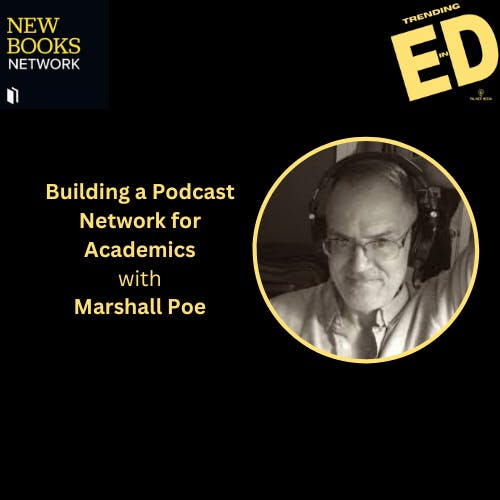
Building a Podcast Network for Academics with Marshall Poe
In this episode, we hear from Marshall Poe, founder and editor of the New Books Network, a podcasting network unlocking expertise and expanding access to learning. As a former Russian historian, Marshall recognized the gap between what experts know and what the public understands. He saw podcasting as a way to bridge this divide.
The New Books Network started as an experiment in 2007 and has since grown into a vast network with over 150 podcasts and a thousand hosts. Marshall views the network as an academic institution, akin to a university press, focused solely on public education. He takes pride in covering esoteric topics and preserving the voices of experts for posterity.
Poe envisions the network becoming a Wikipedia-like resource, where listeners can find smart people discussing any topic of interest. He encourages embracing audio's potential in higher education, with opportunities for AI-powered translation making expert knowledge more accessible.
Key takeaways:
• The New Books Network offers a unique auditory bookstore experience, connecting experts with the public.
• Marshall's commitment to building this "cathedral" of knowledge showcases the enduring power of the spoken word.
• Engaging with the cutting edge of disciplines is valuable, cautioning against oversimplification.
Don't miss this chance to gain insights from Marshall's unique perspective on leveraging the power of audio and podcasting to unlock expertise and expand access to learning.
Subscribe to Trending in Ed wherever you get your podcasts. Visit us at TrendinginEd.com for sharp takes on the intersection between learning and emerging media and podcasts.
38:5825/04/2024
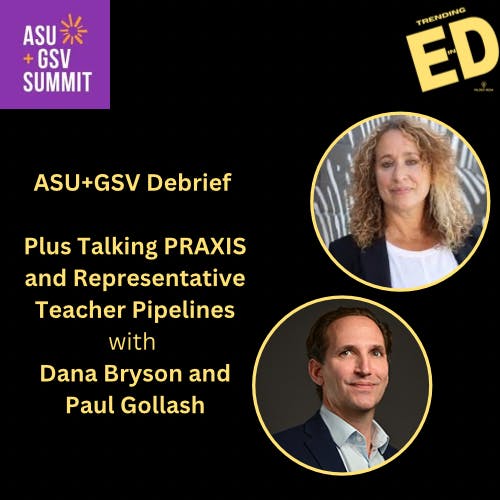
ASU+GSV Recap PLUS Dana Bryson from Study.com and Paul Gollash from ETS on Free PRAXIS Teacher Prep
Mike Palmer takes us on a whirlwind tour through the recent ASU+GSV Summit and AIR Show in San Diego. We hear the buzzing energy of the events as Mike shares his hot takes and insider scoops fresh off the ground.
The AI Revolution Show provided an intriguing glimpse into the new AI-powered products aiming to "supercharge" teachers' capabilities. Mike lauds the vision of positioning AI not as a replacement but as an empowering force operating "behind the teachers" to enhance their impact.
As Mike tours the exhibitor floor, we get the inside scoop on promising platforms like Kyron Learning, and Atypical AI - all striving to bolster teachers with smart content creation tools, personalized instruction, and data-driven insights.
The conference wasn't just about tech though - we hear tales of surprise mascot appearances earning the moniker "Clippy's Revenge." Mike ponders finding the right balance between injecting narrative whimsy while ensuring the human touch remains central.
Shifting to the main ASU+GSV event, we're treated to thought-provoking conversations around higher education's mounting challenges - from the looming "enrollment cliff" to concerns over cost and completion rates. Could partnerships harnessing AI provide a way to improve access and student success?
In a live recorded happy hour interview, we hear directly Paul Gollash from ETS and Dana Bryson from Study.com as they announce an exciting free AI-powered PRAXIS prep offering to support aspiring teachers, especially from underrepresented backgrounds.
Throughout the whirlwind episode, Mike's authentic voice shines through - blending expert analysis with relatable humor and insights gleaned from walking the streets of San Diego. We close on an upbeat note, with Mike feeling newly inspired to dig deeper into the future of education and work through his growing slate of podcasts including EdHeads and The Cusp with Paul Fain.
Subscribe wherever you get your podcasts. Visit us at TrendinginEd.com for more sharp takes on what's emerging in education.
31:5022/04/2024

Navigating Higher Ed Benefits with A Chatbot Named Wyatt with Erika Blumenthal and Daniel O'Donnell
In the episode Mike Palmer hosts Erika Blumenthal, the Chief Operating Officer at Benefits Data Trust (BDT), and Daniel O'Donnell, the Associate Director of Higher Education at BDT. We discuss the organization's mission to help individuals access social safety net benefits in the U.S., with a focus on supporting college students and how they use a Chatbot named Wyatt to communicate benefits to higher ed students.
Erika and Daniel share their professional backgrounds and how they ended up at BDT. We delve into the challenges students face, such as food insecurity and the complex process of applying for benefits like SNAP (Supplemental Nutrition Assistance Program) and the FAFSA (Free Application for Federal Student Aid).
The conversation centers around Wyatt, an AI chatbot developed by BDT to assist students in completing the FAFSA. Daniel explains how Wyatt leverages AI and text messaging to provide scalable support, addressing the need for accessible guidance amid recent FAFSA changes. We reference this Education Northwest Report in the episode.
We also explore the stigma surrounding public benefits, advocating for a shift in language and approach. Erika and Daniel highlight BDT's efforts to raise awareness, simplify processes, and partner with universities and state agencies to connect students with the resources they need to persist and graduate.
Subscribe wherever you get your podcasts. Visit us at TrendinginEd.com for more sharp takes on what's emerging in the world of education.
26:3318/04/2024
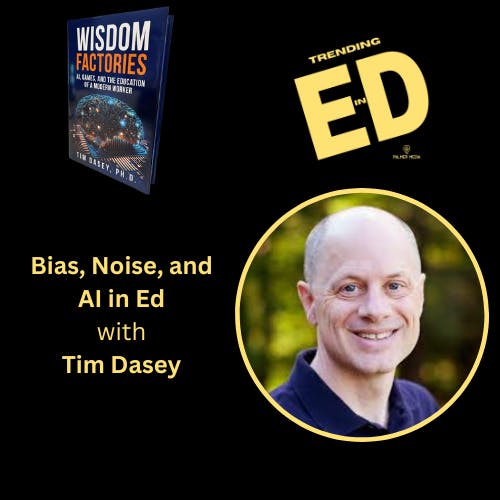
Bias, Noise, and AI in Ed with Tim Dasey
This episode of Trending in Ed explores the explosive growth of AI in classrooms and workplaces. Host Mike Palmer interviews Tim Dasey, author of Wisdom Factories: AI, Games, and the Education of a Modern Worker, about the implications of these rapid changes.
We discuss how AI can support novice learners, the potential risks and biases within AI systems, and the need for critical thinking skills to successfully interact with AI. Dasey emphasizes the importance of adapting our approach to education with AI as a ubiquitous tool, rethinking how we learn, consume information, and develop traditional skills. We pay our respects to the work of Daniel Kahneman and dig into the nuanced differences between noise, bias, and bullshit and what this means to educators, learners, and all of us.
Key Takeaways
AI presents unique opportunities to support new learners, but may have less impact on experts.
Remain aware of potential biases within AI systems. It may not be attributable to ill intent it may be systemic noise and error.
Critical thinking and judgment are crucial for working effectively with AI in the future.
The ways we learn, read, write, and consume information will continue to evolve alongside AI.
Adopt an open-minded and flexible approach to AI as these technologies constantly change.
Timestamps
00:00 Introduction to Trending in Education and AI in Ed
00:36 The Wisdom and Challenges of AI in Education
02:08 AI's Impact on the Workplace and Education
05:15 Exploring AI's Role in Creativity and Problem Solving
15:49 The Complex Landscape of AI, Bias, and Human Judgment
23:31 Future Perspectives on AI and Learning
33:20 Concluding Thoughts on AI, Judgment, and Open-mindedness
35:0815/04/2024

Developing New Leaders, AI and Practice with Jean Desravines
In this engaging episode, Mike Palmer talks with Jean Desravines, CEO of New Leaders, about developing representative leadership in K12 schools. Jean shares his powerful origin story of how education and mentorship saved his life, allowing him to escape a dire path. We learn how New Leaders identifies and develops the next generation of transformative school leaders, with a focus on leaders of color.
Jean provides fascinating insights into what makes an effective school leader, likening the role to a CEO managing stakeholders, budgets, talent, instruction and culture. He emphasizes the critical importance of representation, explaining how teachers of color benefit all students and increase teacher retention. After a few riffs on Allen Iverson (AI), we hear about New Leaders' innovative use of technology like video feedback (similar to sports) to hone leadership skills through deliberate practice. Jean discusses technology's role in enabling personalized learning while underscoring education as an inherently human endeavor requiring social-emotional skills.
The conversation covers thought-provoking topics around preparing students for future careers, improving assessment, and leveraging partnerships with organizations in the community like the work New Leaders is doing with HBCUs and Boeing. Tune in for Jean's inspiring perspective on driving impact and representation at scale through effective leadership development.
Subscribe to Trending in Education wherever you get your podcasts. Visit us at TrendinginEd.com for more sharp takes on the future of education.
28:4508/04/2024
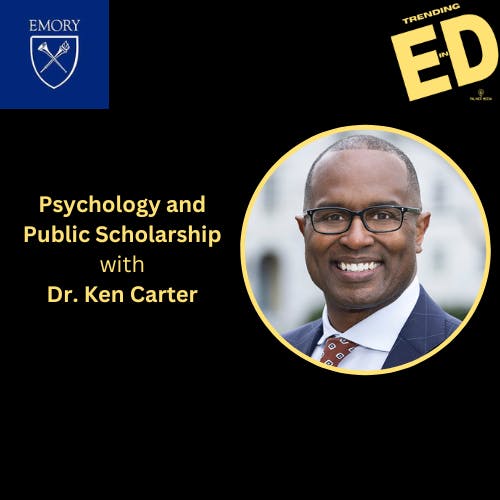
Psychology and Public Scholarship with Dr. Ken Carter
Dr. Ken Carter is a Psychology Professor and the Founding Director of Emory's new Center for Public Scholarship and Engagement. He joins host Mike Palmer in a conversation about bridging the gap between academic research and the public through new initiatives to help academics translate their work for general audiences. Ken shares his own path from aspiring to be a TV anchorman to becoming a clinical psychologist skilled at making complex concepts accessible.
The conversation then shifts to psychology to cover the "epidemic of loneliness" and lack of deep social connections in the social media age. Dr. Carter offers perspectives on AI's potential impacts on mental health and therapy, as well as the importance of building resilience and normalizing failure discussions. He provides insights into navigating the modern media landscape as an expert voice.
Other highlights include lessons from the psychology of extreme sports/thrill-seeking and Dr. Carter's philosophy of maintaining curiosity and awe. Key takeaways include using AI as a "brainstorming tool" while being wary of biases, interventions to combat loneliness like discussing life's challenges openly, and the importance of trusting yourself just as extreme athletes learn to trust their bodies.
Whether you're an academic, mental health professional, educator or just someone fascinated by psychology's role in today's technological era, this engaging episode offers plenty of valuable insights. Tune in for a guide to public scholarship and more from this unique expert.
Subscribe to Trending in Ed wherever you get your podcasts. Visit us at TrendinginEd.com for more sharp takes on the future of learning.
23:4804/04/2024

Can Chatbots Help Fight Absenteeism? with Joanna Smith and Nancy
In this eye-opening episode, host Mike Palmer dives into the alarming rise in chronic absenteeism among U.S. students, as highlighted by a recent New York Times article. The conversation pivots to explore how AI-powered chatbots and personal virtual assistants like "Ed" from AllHere are being leveraged to combat this issue getting notice for their work in the LA Unified School Disctrict. Mike revisits his insightful 2021 interview with AllHere's founder Joanna Smith, who discusses the company's innovative use of conversational AI to foster engagement and support student achievement beyond the classroom.
The episode also features a lively exchange with the show's resident AI co-host, Nancy, as they grapple with the promises and pitfalls of blending human and artificial intelligence in education. Key takeaways include the need for thoughtful design in integrating AI with human empathy, the potential for chatbots to serve as "empathy engines," and the importance of keeping humans in the loop while leveraging AI's scalability. We also reference the NYC chatbot fail discussed here.
Don't miss this timely and thought-provoking exploration of how emerging technologies like chatbots could help solve real-world challenges like chronic absenteeism, while raising crucial ethical considerations about the role of AI in education and human development. Tune in for a nuanced discussion that will leave you pondering the future of human-AI collaboration in fostering student engagement and success.
Subscribe wherever you get your podcasts. Visit us at TrendinginEd.com for more sharp takes on the future of education.
23:5902/04/2024
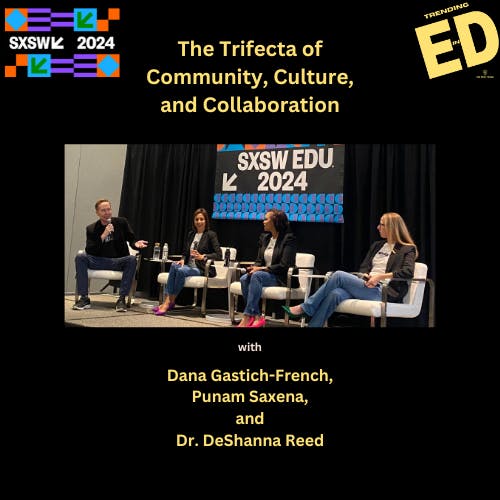
The Trifecta of Community, Culture, and Collaboration LIVE from SXSW EDU
In this special episode recorded live at SXSW EDU 2024, host Mike Palmer moderates a powerful panel on breaking down silos in education. Featuring multilingual learning consultant Dana Gastich-French, special education expert Dr. DeShanna Reed, and parent coach Punam Saxena, the conversation dives into the trifecta of community, culture, and collaboration. Learn how to be a link, while busting silos across the K12 ecosystem.
The panelists, who first met serendipitously at the prior year's SXSW EDU, explore the problems caused by working in isolation and offer solutions for bridging disparate worlds. They advocate creating networked improvement communities, fostering authentic connections through presence and effective communication, and prioritizing the crucial work of humanizing diverse stakeholders.
Punam stresses meeting parents where they are by providing vocabulary and support. DeShanna shares powerful stories of cultivating trust through home visits and communicating in families' native languages. Dana suggests stakeholder groups, documenting processes, empathy interviews to shape school culture, and valuing the "unsexy" moments that truly build community.
With vulnerability, passion and decades of frontline experience, the panelists make a clarion call for a paradigm shift - moving away from inefficient siloing towards meaningful collaboration that embraces the strengths of students, teachers, parents and communities. An inspiring listen for any educator striving to create equitable, inclusive environments for all.
Subscribe to Trending in Education wherever you get your podcasts. Visit us at TrendinginEd.com for more sharp takes on what’s emerging in the learning universe.
52:1228/03/2024

All Toddlers CAN Read with Spencer Russell
Mike Palmer sits down with Spencer Russell, the founder and CEO of Toddlers CAN Read while at SXSW EDU, just after Spencer delivered a keynote there. Spencer shares his journey from being a kindergarten and first grade teacher to taking the leap and starting his own business focused on helping parents teach their toddlers to read. We explore his motivational, step-by-step methodology that breaks down the process into simple, actionable steps that engage both parents and children. Here's the link to the video referenced in the episode.
Spencer emphasizes the importance of giving clear directions to kids instead of asking questions or making statements. He stresses using the right tone, energy and eye contact to keep kids focused during lessons. We explore myth-busting around reading instruction and Spencer advocates for an approach centered on phonics and phonemic awareness. Throughout the approach motivation and psychology are deeply integrated into the literacy curriculum.
Listen in to get a window into Spencer's disciplined lifestyle behind the scenes - from meditation to coaching to optimizing sleep and diet. He talks about manifesting his goal of being a keynote speaker and putting in the hard work to prepare mentally and physically. In his parting words, Spencer encourages listeners to take that first step towards their goals instead of just talking about it.
Key Takeaways:
Use clear directions, not questions or statements, when instructing kids
Start simple with phonics basics before layering on other reading skills
Prioritize consistency and motivating kids over frontloading everything
Manifesting goals requires dedicated preparation across all aspects of life
Don't miss this inspirational look at breaking down reading for toddlers and living with intention to achieve your dreams.
Subscribe to Trending in Ed wherever you listen to pods. Visit us at TrendinginEd.com for more.
32:0325/03/2024

SXSW EDU March Madness of Learning Trends LIVE
In a lively and thought-provoking session at SXSW EDU 2024, Mike Palmer, host of the Trending in Education podcast, and a panel of experts delve into the "Sweet 16" of learning trends for the year. The discussion covered a wide range of topics, from hyper-personalized learning and the role of AI in education to the importance of mental models and the responsibility of being an "accomplice" in driving positive change.
The panelists, including Melissa Griffith from Kaplan, Beth Rudden from BAST AI, and Dr. Robin Naughton from Queens College, brought unique perspectives and insights to the table. We explore the potential and challenges of AI, highlighting the need for critical thinking, ethical considerations, and a human-centered approach to technology.
One of the key themes that emerged was the importance of empowering learners and educators to engage with AI responsibly and effectively. The panelists emphasized the need for transparency, explainability, and a deep understanding of the models and data that underlie these technologies. We also discussed the role of mental models, biomimicry, and ancestral intelligence in shaping our interactions with AI and fostering a more inclusive and equitable learning environment.
As the session draws to a close, we encourage the audience to stay engaged and informed about the rapidly evolving landscape of learning trends. This officially kicks off our tournament throughout March, allowing listeners to vote on their favorite trends. Visit us at TrendinginEd.com and follow Mike on LinkedIn to track the tournament and stay up-to-date with the latest discussions and insights.
56:4221/03/2024
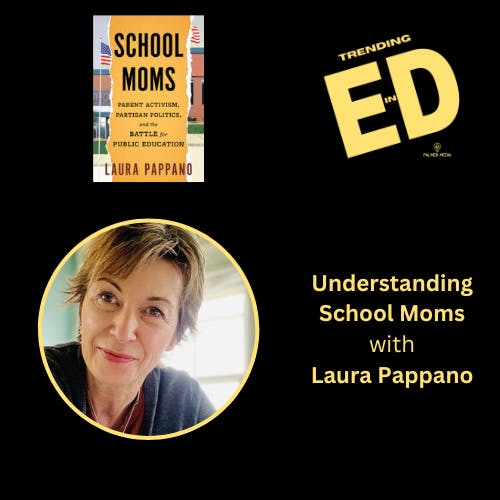
Understanding School Moms with Laura Pappano
In this thought-provoking episode, Mike Palmer welcomes education journalist Laura Pappano to discuss her new book School Moms: Parent Activism, Partisan Politics and the Battle for Public Education. Laura shares her experiences attending Moms for Liberty summits, witnessing alarming rhetoric portraying public schools as indoctrination centers. She also touches on the work she is doing at the New Haven Student Journalism.
While marketed as a grassroots parent movement, we learn Moms for Liberty is well-funded by far-right groups aiming to shift the political balance of local school boards. Laura recounts the transformation from 2022 to 2023 summits, with protestors surrounding the latter event in Philadelphia amid heightened tensions.
The conversation highlights how extremist tactics like book bans and policies stripping educator authority threaten public education's democratic foundations. We explore the concerning nationalization of these trends, with local school boards becoming partisan battlegrounds disconnected from community needs.
However, Laura reminds us public schools remain vital unifying spaces for children's growth and identity development. While imperfect, the system provides an essential community fabric to nurture, not destroy. By coming together, valuing expertise, and rejecting disinformation, we can preserve quality public education. The stakes are high, but our potential for positive impact as engaged citizens remains.
Subscribe to Trending in Ed wherever you get your podcasts. Visit us at TrendinginEd.com for more sharp takes on the future of education.
38:1318/03/2024
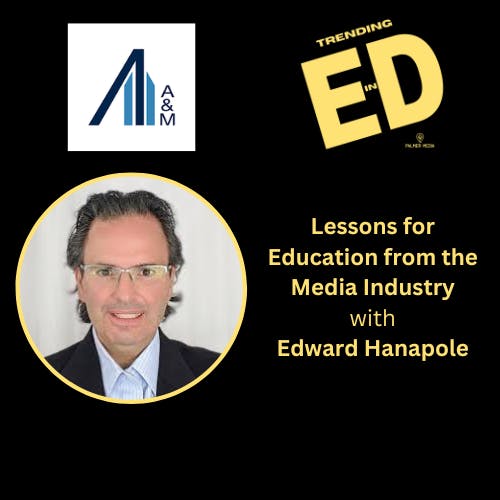
Lessons for Education from the Media Industry with Edward Hanapole
Edward Hanapole leads the media and entertainment practice at Alvarez and Marsal. He brings a unique perspective to his conversation with host Mike Palmer, having worked across major media sectors including education, publishing, and broadcast.
We discuss how media companies are adapting to direct-to-consumer models in a post-pandemic world. Edward notes they are having an "existential moment" realizing they must operate more like technology companies. He sees parallels in education's shift to digital experiences. Students now expect education delivered differently, more like media and entertainment content.
Hanapole believes focusing on the consumer is key for both media and education. Investments target enhancing the user experience while ensuring educational rigor. We explore how artificial intelligence can aid creation of lessons and personalization. However, entertainment value shouldn't overwhelm learning objectives and outcomes. Stealth learning that sneaks in education while engaging users has potential.
On human-AI collaboration, Edward discusses an AI advisor Kaplan is developing to replicate personalized guidance at scale. The system engages users with an intent, while continuously learning from interactions. Overall, he stresses not fearing new technologies. By embracing them, we gain the learning needed to innovate thoughtfully. Measuring outcomes ensures human advancement remains the objective.
Subscribe to Trending in Education wherever you get your podcasts. Visit us at TrendinginEd.com for more sharp takes on what’s emerging in the learning universe.
38:1714/03/2024
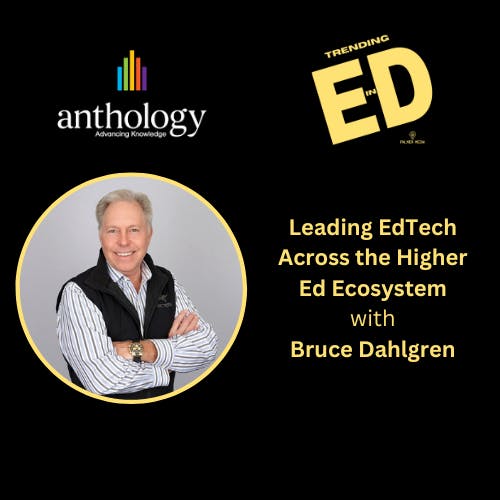
Leading EdTech Across the Higher Ed Ecosystem with Bruce Dahlgren
Bruce Dahlgren, CEO of Anthology, joins host Mike Palmer for an edtech discussion informed by Bruce's extensive IT background and higher ed governance along with his vision for the growth of the platform.
With over four decades across enterprise software, data infrastructure, fintech (financial technology), and cybersecurity, Bruce brings valuable outside perspective to leading this major edtech player. He shares unique insights on leveraging AI, analytics, and integrated platforms to enable personalized, seamless learning. Bruce discusses Anthology's ecosystem spanning the Blackboard LMS (learning management system), ERP (enterprise resource planning), CRM (customer relationship management), and more.
As a technology expert and voice in higher ed governance, Bruce makes the case that AI and analytics can create a more holistic student journey from recruitment to career outcomes and alumni engagement. Key themes include using Anthology's AI Design Assistant for quickly building courses, its ethical AI framework, and the critical role of security in edtech. We also reference this white paper.
Bruce argues his multifaceted background helps connect enterprise tech innovation with higher ed trends. He provides perspective on using edtech to drive student engagement, preparedness, and institutional success. Don't miss it!
Subscribe to Trending in Education wherever you get your podcasts. Visit us at TrendinginEd.com for more sharp takes on what’s emerging in the learning universe.
25:5311/03/2024
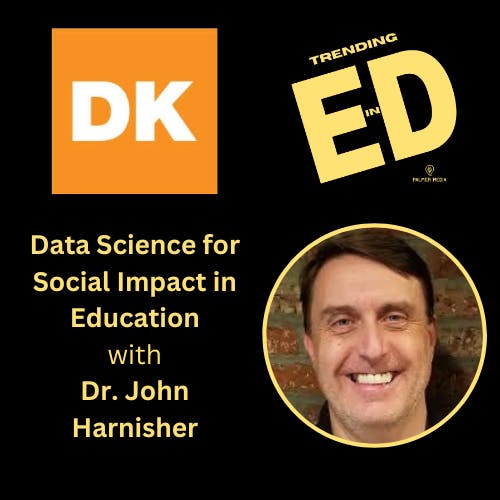
Data Science for Social Impact in Education with Dr. John Harnisher
Dr. John Harnisher, who leads the education practice at DataKind joins host Mike Palmer in a conversation about how data science can drive social impact in education. Having known each other for over 10 years, we have an engaging conversation reflecting on John's journey in the learning field.
John gives us an inside look at DataKind's mission of bringing data science and AI capabilities to social impact organizations. He shares a case study from their work with John Jay College in New York, where they built machine learning models to predict which students were at risk of not graduating. By providing this data to academic advisors, John Jay was able to improve graduation rates by 30%.
We discuss the importance of keeping humans involved when implementing AI, rather than just optimizing for the technology. We also cover topics including trust in data, the hype cycle around AI, and how to measure impact. John emphasizes that we should focus AI on core problems facing education organizations, not just chase the latest "new hotness."
Don't miss this chance to learn more about how data science and AI can make a social impact in education and beyond.
Subscribe to Trending in Education wherever you get your podcasts. Visit us at TrendinginEd.com for more sharp takes on what’s emerging in the learning universe.
33:2107/03/2024
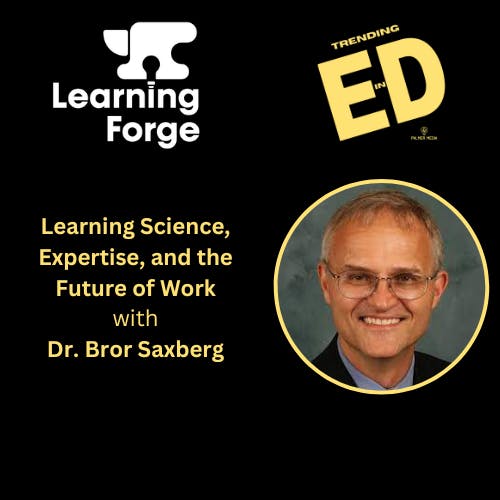
Learning Science, Expertise, and the Future of Work with Dr. Bror Saxberg
In this episode, host Michael Palmer welcomes back Dr. Bror Saxberg, Founder of LearningForge, to continue their exploration of learning and its implications for the future. We dig into core concepts like working memory vs long-term memory, deliberate practice and the 10,000 hour rule, and what the latest research reveals about differences (and similarities) in learning rates. Dr. Saxberg emphasizes the brain's lifelong neuroplasticity and potential for acquiring new skills and knowledge.
The conversation then shifts to expertise more broadly, including how cognitive scientists study it and the decline in professional skill "half-lives." Bror and Michael discuss organizational training, creativity from combinatorial expertise, and the unique human capacity for shared meaning. We explore how improving learning environments and motivation, per a recent study, can help accelerate expertise development across all levels of learners. The episode wraps with optimism about human potential to gain new competencies and value, aided by learning science insights and emerging technology.
Subscribe to Trending in Education wherever you get your podcasts. Visit us at TrendinginEd.com for more sharp takes on learning, media, and the future of work.
43:0304/03/2024
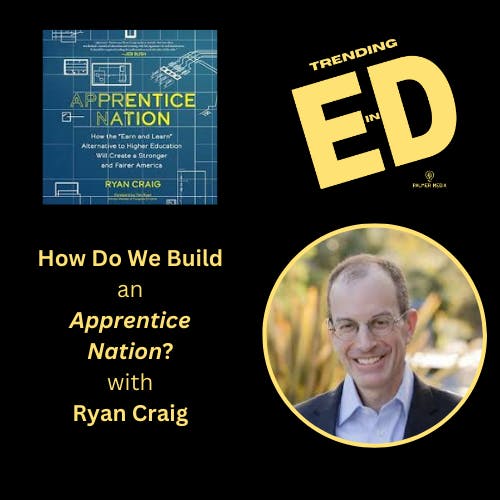
How Do We Build an Apprentice Nation? with Ryan Craig
In this week's episode of Trending in Education, Ryan Craig, author of the new book Apprentice Nation: How the "Earn and Learn" Alternative to Higher Education Will Create a Stronger and Fairer America, joins host Mike Palmer to dive into how "earn and learn" models like apprenticeships can bridge the growing experience gap facing young workers seeking their first good job.
Craig makes a compelling case for why apprenticeships should be a mainstream option for high school graduates, not just a pathway for trade occupations. He argues apprenticeships can provide the work experience and skills training needed to prepare young people for high-demand roles in fields like cybersecurity, healthcare, and software development while presenting a less risky alternative to the loan-based approach that predominates in higher education.
The discussion reveals how apprenticeships have languished in the US compared to countries like Switzerland and Germany. Craig advocates passionately for greater government investment and support for intermediaries that can set up and run apprenticeship programs at scale. Without this kind of backing, companies lack incentives and capacity to provide these earn-and-learn opportunities. The lively exchange offers thought-provoking ideas around closing both the skills gap and the growing "experience gap" faced by college graduates who aren't graduating ready to work. Craig warns that employers are increasingly expecting entry-level hires to already have real work experience. Apprenticeships and other earn-and-learn models can help bridge this divide.
If you care about creating new pathways to economic mobility and opportunity for young Americans in the digital age, you won't want to miss this forward-thinking discussion. Tune in to hear Craig's compelling vision for how an "Apprentice Nation" could transform education and workforce training.
Subscribe to Trending in Education wherever you get your podcasts. Visit us at TrendinginEd.com for more sharp takes on the future of education.
30:1429/02/2024





